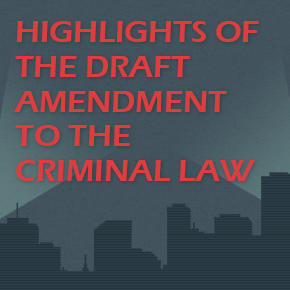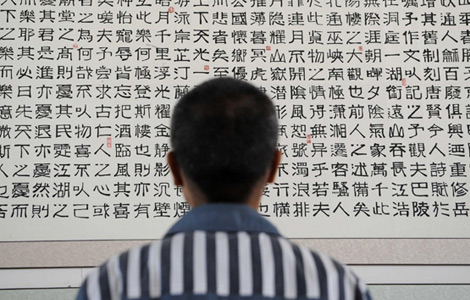Wu Aiying: Advancing Human Rights Protection in China Through Judicial Administration
Editor's note: The author of this article is Wu Aiying, the Minister of Justice. It was written to welcome the upcoming second Constitution Day and was originally published in the book 2004-2014 — The Decade after Human Rights was Articulated in the Constitution of the People's Republic of China.
The Communist Party of China and the Chinese Government have always attached much importance to respect for and protection of human rights. On March 14, 2004, the Second Session of the Tenth National People’s Congress adopted an amendment to the Constitution, stating that “[t]he State respects and protects human rights”. During the ten years since then, the Ministry of Justice and judicial administrative organs at all levels have earnestly implemented the Constitution, fulfilled their duties according to law, and reformed and improved the system and mechanisms, thus contributing greatly to the development of China’s human rights cause.
I. Publicity and education campaigns have been conducted for human rights and rule of law to increase social awareness of human rights protection.
It is a great creation of the Chinese Government to increase society’s awareness of human rights protection and rule of law through publicity and education campaigns with a view to advancing human rights protection. Since the concept of human rights was articulated in the Constitution ten years ago, the Chinese Government has consistently carried out such campaigns, laying down a solid foundation for the respect for and protection of human rights.
1. Extensive constitutional education
The Constitution is the basic law of the country and also the basic law to protect human rights. The Ministry of Justice and judicial administrative organs at all levels prioritize the publicity and education on the constitution in the national effort to popularize legal knowledge. They have focused on publicity of the Constitution, the significance of putting human rights in the Constitution, and provisions on respect for and protection of human rights in the Constitution. December 4, the date of entry into force of the current Constitution, was made a National Legal Publicity Day. Activities such as lectures, themed speeches and knowledge contests are organized on the day and help increase people’s awareness of human rights protection and translate respect for and protection of human rights into conscious actions.
2. Human rights protection and rule of law as important contents in national effort to popularize legal knowledge
The government insists on a people-oriented approach and has increased publicity of regulations closely linked to people’s life and work such as employment, education and healthcare so as to enhance social awareness of such basic rights as education and health. In the process of social reform and urbanization, the government has enhanced publicity of regulations and Laws on property rights protection, urban housing demolition and relocation, land expropriation and transfer of land use rights in order to increase awareness for the protection of property and other basic rights according to law. With regard to special populations, the government has increased publicity of regulations and laws on the protection of women, children, senior citizens and the disabled so as to increase awareness for the protection of the rights to subsistence and equality as well as the right of person. To protect human rights in the judicial process, the government has increased publicity of legal institutions with regard to civil, criminal and administrative procedures, thus enhancing awareness of the protection according to law of the right of person and right to defense and compensation for the defendants, detainees and prisoners. At the same time, the idea of unity of rights and obligations is planted by advocating that citizens should meet corresponding obligations while exercising their rights. With extensive publicity campaign, human rights protection and rule of law have taken deep root in people’s minds and a sound environment has been created for human rights protection.
3. More targeted and effective communication
As government officials and civil servants are key to human rights and rule of law publicity and education, actions have been taken to increase their awareness of human rights protection and enable them to pursue a people-oriented approach and protect citizen’s lawful rights and interests in their effort to promote economic and social development, serve and improve people’s livelihood and increase social welfare. Through activities of the “six entries of law” that spread legal knowledge in government agencies, rural areas, communities, schools, enterprises and work units, human rights and rule of law is also promoted both extensively to all sectors of the society and vertically to grass-roots so as to expand its coverage and influence. New and innovative means of publicity have been used for example legal provisions, making the campaign more attractive and convincing and the communication more targeted and effective.
II. Conducting punishment strictly and protecting human rights according to law.
The judicial administrative organs are the implementers of custodial and non-custodial penalties and shoulder important duties in human rights protection. Judicial administrative organs at all levels conduct strict, just and civilized law enforcement, thus protecting and advancing the protection of human rights.
1. Good implementation of custodial penalties
Prisons are where imprisonment is implemented. Judicial administrative organs protect human rights according to law by seriously implementing the Prison Law and strictly carrying out punishments.
First, work to educate and reform criminals has been strengthened. It is the central task of prisons to educate and reform criminals. With this in mind, a series of rules have been developed, such as Provision on Education and Reformation Work of Prison, containing various education and corrective measures including ideological, legal, cultural, administrative and labor education. Psychological counseling and treatment for inmates and personalized education and individual case treatment are conducted extensively. Since 2008, more than one million inmates have received vocational qualification certificates and more than 6,000 have got junior college degrees or above, increasing their ability to return to society. Special education and reformation measures have been taken towards female and juvenile prisoners, resulting in better results from education and reformation.
Second, law enforcement has been further standardized. Campaigns such as “Standardizing Law Enforcement and Advancing Impartial Law Enforcement” and “Year of Standardized Management” have been conducted on a continuous basis. Law enforcement standards and procedures for prisons have been set, covering education, management, enforcement, labor, protection of criminal’s rights and supervision, thus standardizing and institutionalizing law enforcement. The rights of inmates to defense, appeal, accusation, impeachment, communication and meeting are protected according to law. The prison police are strictly prohibited to corporally punish, abuse, insult or beat up inmates or instigate others to do so. Prison affairs have become more transparent and subject to supervision from inmates, their families and the rest of the society to make law enforcement in prisons more transparent and credible. The system of superintendence has been made more robust to oversee law enforcement.
Third, safety at work and living and medical security of inmates have been improved. Actions have been taken to improve their working conditions and working environment. Medical security is ensured by placing inmates also under local health and immunization programs.
Fourth, prison reforms have been deepened to adjust prison layout, advance informatization of prison and improve conditions for law enforcement and reformation, thus laying down the foundation for the protection of inmates’ legitimate rights and interests.
2. Improved community correction
In China, community correction is an implementation system for non-custodial penalties that put convicts who have been sentenced to control, probation, release on parole or temporary service outside in community for correction. It is a major reform embodying the constitutional principle to respect and protect human rights, an important measure to implement the criminal policy of combining punishment with leniency and an important achievement in judicial protection of human rights since the concept was articulated in the Constitution. Community correction was started in 2003 and is now rolled out after pilot, expanded pilot and comprehensive trial implementation. By the end of September 2014, there had been 2,113,000 convicts serving their sentences under community correction across the country, among whom 1,382,000 had been relieved and 731,000 are still registered. The rate of recidivism during the period of correction has been at a relatively low level of 0.2%. judicial administrative organs at all levels have seriously implemented community correction tasks, strengthens supervision and management and implemented rules of reporting, address changing and leave of absence, thus effectively avoided miss-out and drop-out. Education and correction are constantly strengthened and improved with the provision of ideological education, legal education, social morality education, personalized correction, psychological counseling and community service. Concrete actions are taken to help those serving sentences in community solve problems in employment, education, temporary aid and subsistence allowances so that they are better enabled to adapt to the society. Temporary boarding, skill training and employment guidance are provided for those in difficulty. These measures help people serving sentences in community to return to society.
At the same time, judicial administrative organs at all levels take proactive actions to help people who have been released upon completion of their terms to settle down. Work mechanisms have been established to facilitate transfer from prison back to the society. Efforts are made to advance with mainly government investment the construction of transitional settlement base for those released and set up 141 such bases in the country, providing released former prisoners who have no family or relatives or job with free boarding for three to six months plus psychological counseling, skill training and employment service. Such assistance as well as continued ideological, political, legal, moral and cultural education and efforts to push for the implementation of policies of employment support and social security for the former prisoners are useful in solving their problems and improving their ability to adapt, thus greatly facilitating their return to the society.
III. Providing legal services to protect the legitimate rights and interests of citizens.
Making sure that citizens receive effective legal aid is a basic requirement in human rights protection. Over the years, judicial administrative organs at all levels have earnestly performed their duties, improved institutions of legal counsel and legal aid, and advanced the establishment of a public legal service system, playing an important role in ensuring correct implementation of law, safeguarding social fairness and justice and protecting citizens’ legitimate rights and interests.
1. Ensuring lawyer’s positive role in human rights protection
Lawyers play an important role in protecting human rights. Judicial administrative organs at all levels have carried out effective measures to make sure that lawyers fully perform their duties in human rights protection according to law.
First, the lawyer profession is vigorously promoted. The profession is also covered in social and economic development plans and actions are taken to advance its development so as to meet people’s needs for legal services. Between 2004 and 2013, the number of law firms increased by 41%, from 14,500 to 20,400; the number of lawyers increased by 74%, from 145,100 to 252,400. Lawyers provide efficient and high-quality legal service for the public in criminal defense and civil actions. In 2013, lawyers handled more than 2.5 million lawsuits and 810,000 non-litigation legal affairs, making positive contribution to maintaining social justice and protecting human rights.
Second, the lawyer system has been reformed and improved. The 2012 revised Criminal Procedure Law clarified lawyer’s position as well as their rights and duties in litigation procedures. The Lawyers Law was revised in 2007. It affirmed the achievement of the reform and development of the lawyer system. In all rounds of reforms of the judicial system and its work mechanisms, the lawyer system reform has been an important part, with specific targeted measures. The Ministry of Justice has formulated or revised 16 department rules and normative documents such as Administrative Measures for the Practice of Law by Lawyers, which have contributed to the improvement of the lawyer system and provided basic guarantee for lawyers to perform their duties according to law.
Third, lawyer’s right to practice law is protected according to law. The Criminal Procedure Law and the newly revised Lawyers Law added and strengthened lawyer’s rights to meeting, access to documents and investigation and evidence gathering during a lawsuit, especially for criminal litigation. Judicial administrative organs at various levels and lawyers associations consulted related government departments to establish and improve work mechanisms to protect lawyers’ litigation rights and strictly implement according to law lawyers’ rights to meeting, reading documents, gathering evidence, questioning, cross-examination and debate in practice of law in criminal lawsuits. Service facility for lawyers’ meeting and access to case files has been established to facilitate their practices. Relief mechanism has been developed with procedures to rectify situations in which the exercise of lawyer’s litigation rights has been obstructed. The All China Lawyers Association and local lawyers associations actively perform their duties to safeguard the rights of practicing lawyers according to law.
2. Vigorously advancing work related to legal aid
Legal aid is an important legal system by which the state provides free legal service for citizens with financial hardships and parties in special cases so as to ensure equal realization of their legitimate rights and interests. It is an important way to protect the human rights of vulnerable social groups.
First, the legal aid system has been improved. In 2003, the State Council enacted Regulations on Legal Aid and revised the Criminal Procedure Law, which expanded the scope of application of legal aid in criminal proceedings and extended the assistance from the trial phase to investigation, review and prosecution phases. The Ministry of Justice and other relevant departments issued Provisions for the Work on Legal Aid in Civil Actions and Provisions for the Work on Legal Aid in Criminal Actions, which improved the connection between legal aid and judicial relief in civil actions and the legal aid coordination mechanism in criminal actions involving public security organs, procuratorial organs, people’s courts and judicial administrative organs, thus creating a complete system of work on legal aid.
Second, the coverage of legal aid has been expanded. The protection of rights and interests closely related to people’s livelihood such as healthcare, employment, education, labor remuneration and social security are included as items for the consideration of legal aid so as to benefit more people in strained circumstances. During the last ten years, legal aid organizations all over the country handled 6.85 million legal aid cases and provided legal aid to 86.55 million people, effectively protecting the legitimate rights and interests of people in strained circumstances.
Third, convenience services are provided in legal aid. Campaigns to enhance the convenience of legal aid have been conducted with ten convenience measures adopted all over the country. Grass-roots service network, convenience counters and service stations have been developed to extend legal aid to grass-roots communities and villages. There are now 65,000 legal aid service stations. Measures have also been taken to open application channels and simplify acceptance and examination procedures. Legal aid work concerning vulnerable groups such as migrant workers, women, children, senior citizens and the disables has been strengthened to protect their legitimate rights and interests.
Fourth, the ability to fund legal aid has been strengthened. A system of legal aid funds shared between central and local government is in place. In the last ten years, fiscal input in legal aid has increased on average by 16.6% annually. The total input in 2013 was 6.6 times of that in 2004.
3. Developing a public legal service system with concrete actions
To establish a public legal service system so as to meet people’s basic needs is an important measure to advance human rights protection. The Ministry of Justice formulated Opinions on Advancing the Building of Public Legal Service System to speed up the building of a public legal service system that is suited to the national conditions, covers both urban and rural areas and benefits all people.
First, a public legal service network is developed. Legal service resources including lawyers, notarization, grass-roots legal service and judicial expertise have been mobilized and judicial administrative legal service centers and stations have been established at the county, township and village levels for people to get legal service conveniently.
Second, scope of public legal service is vigorously expanded to areas closely linked to people’s livelihood so as to meet people’s basic needs.
Third, policy support has been increased. Public legal service has been integrated into government public services and as items for government procurement, thus providing strong support for the development of the public legal service system.
By Wu Aiying, Minister of Justice
Origional translation by Niu Ya’nan



